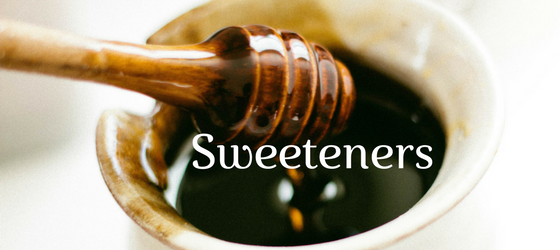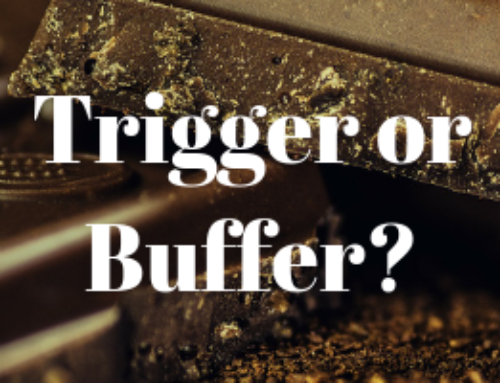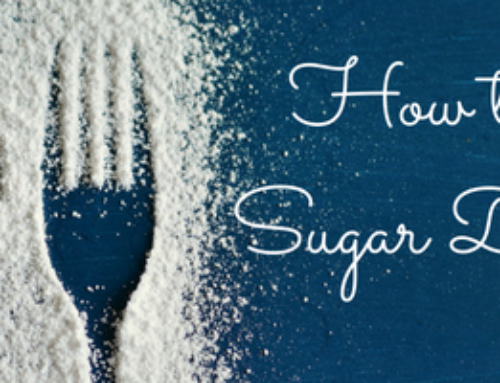In my last blog post, I discussed what sweeteners to lose – like sugar, high fructose corn syrup, and artificial sweeteners. You can read that here. Today, let’s look at what sweeteners to choose.
Sugar Alcohols, my favorites are xylitol and erythritol.
Sugar alcohols have a very low glycemic index, meaning they do not spike blood sugar. For example, the glycemic index of xylitol is seven. Regular sugar has a glycemic index of 60 – 70. One-hundred is the highest number on the glycemic index. Having a low glycemic index means that the sugars enter the blood stream at a much slower rate. Entering the blood stream at a slower rate, not only prevents blood sugar spikes, but also allows for a smaller output of insulin — good for overall metabolic health. Sugar alcohols also have half the calories as sugar. One gram of xylitol has 2 calories, compared to 4 calories per gram of sugar. Xylitol and erythritol are comparable in sweetness to sugar, if not a tad less sweet. Xylitol has a slight ‘cooling’ flavor to it, but no yucky aftertaste like artificial sweeteners do, and it has a texture similar to sugar. I like sprinkling it on plain yogurt to take some of the tang away. Xylitol also improves oral health by increasing salivary flow, balancing pH levels, and reducing the bad bacteria in the mouth.
One word of caution is to use sugar alcohols in smaller amounts, as too much at one time can cause digestive upset in some people. This is especially true for those who have candida (yeast overgrowth) or SIBO. These individuals already have excess gas, so while sugar alcohols won’t feed the yeast or bacteria, they can cause bloating, which is not a good thing. Sugar alcohols should be used with caution by individuals with gut issues.
Stevia is an extract from the plant Stevia rebaudiana that has a sweetness about 150 times as sweet as sugar. There is an herbal note to it, which some individuals don’t prefer. It can be found in drops or as a powder. Truvia® is the most commercially available stevia product and is a mixture of stevia and erythritol. It can be found in many coffee shops as an alternative for sugar and artificial sweetener packets.
Monkfruit is a fruit that grows in Asia, and contains compounds known as mogrosides, which when extracted and processed, produce a sweet factor about 300 times sweeter than sugar. Much like stevia, monkfruit does not have an effect on blood sugar. All these sweeteners can be found in the natural foods section of the grocery store.
Sweeteners to enjoy in small amounts, on special occasions, and only if you are tolerant.
Raw honey – local if possible. Evidence indicates eating local honey can help individuals with hay fever symptoms such as sneezing or runny nose. This is because bees will collect pollen spores on their bodies and then transfer them to the honey. Eating small amounts of local honey can help one build up immunity through gradual exposure to the local allergens that can evoke allergy symptoms. Honey has a glycemic index of 45 – 64.
Blackstrap molasses does contain some iron, calcium, magnesium, potassium, selenium and vitamin B6. However, I would not suggest using a sweetener to obtain these nutrients. You will obtain more micronutrients from other whole foods that have very little sugar impact like meats, eggs, plain yogurt, or leafy greens. Blackstrap molasses has a glycemic index of 55.
Liquid sweeteners like honey and blackstrap molasses often have more sugar grams per teaspoon than regular white sugar because their liquid nature makes them more dense. So again, enjoy these in small amounts.
Please note, it is only suggested to occasionally use honey and blackstrap molasses:
- If you are carbohydrate tolerant – in other words you don’t have any blood sugar instabilities like hypoglycemia, pre-diabetes, or diabetes.
- If you are very active – so you burn off the sugar!
- If you don’t have digestive imbalances like candida (yeast overgrowth) or SIBO. Sugar can feed yeast and certain bacteria, which can exacerbate symptoms and cause the microorganisms to multiply.
If you crave sugar, and find yourself seeking out sweet foods or even artificially sweetened food, then getting off the sweet flavor is one of the best things you can do to retrain your taste buds. Just because some sweeteners are better than others, doesn’t mean to consume them without constraint.
However, if you do need help weaning off the sweet, then I do have several functional food bars available in my on-line store that use sugar alcohols and stevia as sweeteners. These are great snacks or treats that can be helpful when a craving hits. My all time favorite (as well as a client favorite) is the Cocommune bar, which is coconut and dark chocolate based. YUM! You can look at a nutritional comparison of all the bars available in my on-line store here in this quick PDF– DFH Functional Food Bars.
The holiday season can be tough, with all the sweet treats available. But remember, it is easier to stay off them, than to succumb to a month of sugary indulgence and the hangover than can come with it. I hope you use these tips to help you through the season.
As always, if you found this information helpful, please share with family and friends.






